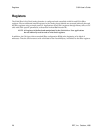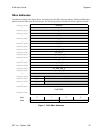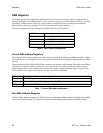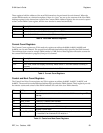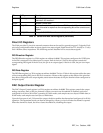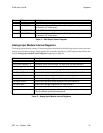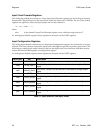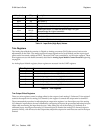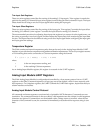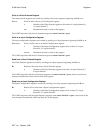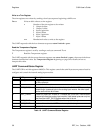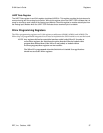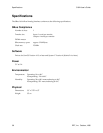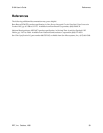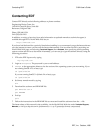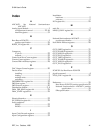
Registers S16A User’s Guide
34 EDT, Inc. October, 1996
Trim Input Gain Registers
These two trim registers control the fine-tuning of the analog I/O input gain. Trim register 4 controls the
gain trim for analog I/O channel 0 input; trim register 6 controls the gain trim for channel 1 input. The input
offset should be set using a zero-level input signal before setting the input gain.
Trim Input Offset Registers
These two trim registers control the fine-tuning of the input gain. Trim register 5 controls the input offset
for analog I/O channel 0; trim register 7 controls the input offset for analog I/O channel 1.
The recommended procedure for adjusting these input trim registers is to connect it to the signal source, set
the source to generate a zero-level signal, and then adjust the input offset while monitoring the input data
for zero. The input offset trim should be set using a zero-level input signal before configuring the input gain
and input gain trim settings.
Temperature Register
The S16A contains an internal temperature probe that can be read via the Analog Input Module UART
interface to provide data for temperature-dependent calibration adjustments. This two-byte register returns
a 12-bit reading that can be converted to a Celsius temperature using the formula
C = ((5.0 * (r / 4096)) - 1.375) * 0.0225
where
r is the raw temperature reading, and
C is the resulting Celsius temperature.
As an Analog Input Module register, this register is accessed via the UART registers.
Analog Input Module UART Registers
The S16A Analog Input Module is configured and controlled by a byte stream protocol via two UART
registers on the SBus. Command sequences of bytes are sent to the module, which in turn responds with
byte sequences. Two interface registers, the UART CSR and the UART Data register, implement this byte
stream interface on the SBus.
Analog Input Module Control Protocol
All command and status sequences consist entirely of printable ASCII characters. Commands are case-
insensitive. The command character is always echoed; valid arguments are also echoed; invalid argument
characters are ignored. Commands are not terminated with a carriage return or newline: when the last
character of the command is sent, the command is immediately executed and the response string is sent
back.



